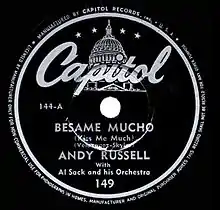Bésame Mucho
"Bésame Mucho" ("Kiss me a lot") is a song written in 1940 by Mexican songwriter Consuelo Velázquez.[1] It is considered one of the most popular songs of the 20th century and of all times. It is also one of the most important hymns in the history of Latin music and It is also the most recorded and covered song in Spanish of all time .[2][3] A famous 1956 version is sung by Trio Los Panchos and female vocalist Gigliola Cinquetti. An English lyric was written by Sunny Skylar.
| "Bésame mucho" | |
|---|---|
| Single by Consuelo Velázquez | |
| Language | Spanish |
| Released | 1940 |
| Genre | Bolero |
| Composer(s) | Consuelo Velázquez |
| External audio | |
|---|---|
It is one of the most famous boleros, and was recognized in 1999 as the most sung and recorded Mexican song in the world.
The song appeared in the film Follow the Boys (5 May 1944) when it was played by Charlie Spivak and his Orchestra[4] and in Cowboy and the Senorita (13 May 1944) with vocal by Dale Evans.[5]
Inspiration
According to Velázquez herself, she wrote this song even though she had never been kissed yet at the time, and kissing, as she heard, was considered a sin.[6][7]
She was inspired by the piano piece "Quejas, o la Maja y el Ruiseñor", from the 1911 suite Goyescas by Spanish composer Enrique Granados, which he later also included as "Aria of the Nightingale" in his 1916 opera of the same name.[1]
In politics
In Brazil in 1990, an affair between the Minister of Economics Zélia Cardoso de Mello and the minister of Justice Bernardo Cabral was revealed when the two danced cheek to cheek to "Bésame Mucho."[8] A few days later, the presidential band was to introduce Cardoso de Mello with a military march. Instead, the director of the band had them play "Bésame Mucho." He was placed under house arrest for 3 days for insubordination.[9]
Notable versions

- Bob Eberly and Kitty Kallen with Jimmy Dorsey & His Orchestra (reached number one in the United States in 1944)[10]
- Andy Russell (reached No. 8 in the USA in 1944)[11][12]
- Xavier Cugat, who recorded the song with the Waldorf-Astoria Orchestra and a vocal chorus by Del Campo for Columbia Records (#36852, 1945)[13]
- The Beatles (recorded during their Decca audition on January 1, 1962. A second version was recorded during their first session at Abbey Road Studios on June 6, 1962. The latter is included on The Beatles' Anthology 1)[14]
- Plácido Domingo (received a Grammy nomination for Best Latin Pop Performance in 1983)[15]
- Cesária Évora (In 1997 Évora sang in Kriolu, a Creole language mixing Portuguese with the west African dialects of her ancestors. This was one of the few songs she sang in a different language)
- Pedro Vargas (inducted into the Latin Grammy Hall of Fame in 2001)[16]
- Zoé (nominated for a Latin Grammy for Record of the Year in 2012)[17]
References
- Fox, Margalit (January 30, 2005). "Consuelo Velázquez Dies; Wrote 'Bésame Mucho'". The New York Times.
- by SocialMusik (2019-12-05). "Bésame mucho, la canción en español más versionda - Social Musik". Socialmusik.es. Retrieved 2021-01-15.
- "Hispanic Heritage Month: The 50 Best Latin Songs of All Time". Billboard.com. 2020-09-15. Retrieved 2021-01-15.
- "Follow the Boys (1944)". imdb.com. Retrieved May 12, 2017.
- "Cowboy and the Senorita (1944)". imdb.com. Retrieved May 29, 2017.
- "Bésame Mucho Consuelito Velazquez News Feature". YouTube. 2008-08-19. Retrieved 2011-02-14.
- Burton, Tony. "Did You Know? Consuelo Velázquez and "Bésame mucho". : Mexico Culture & Arts". Mexconnected.com. Retrieved 2011-02-14.
- "Headliners; Internal Affair". New York Times. New York. 21 Oct 1990. Retrieved 20 Dec 2014.
- "Band Hits Sour Note". Winnipeg Free Press. Winnipeg, CA. 6 Nov 1990. Retrieved 20 Dec 2014.
- Whitburn, Joel (1986). Joel Whitburn's Pop Memories 1890–1954. Menomonee Falls, Wisconsin: Record Research Inc. p. 132. ISBN 0-89820-083-0.
- Whitburn, Joel (1986). Joel Whitburn's Pop Memories 1890–1954. Wisconsin: Record Research Inc. p. 476. ISBN 0-89820-083-0.
- Gilliland, John. (2020-03-23). "Pop Chronicles 1940s Program #11 - All Tracks UNT Digital Library". Digital.library.unt.edu. Retrieved 2021-01-15.
- "Bėsame Mucho" – Xaviar Cugat and the Waldorf-Astoria Orchestra and Del Campo at archive.org
- "A 50 años del Bésame mucho de los Beatles". BBC. July 9, 2012. Retrieved August 17, 2017.
- "Complete List of the Nominees for 26th Annual Grammy Music Awards". Schenectady Gazette. The Daily Gazette Company. January 9, 1984. p. 49. Retrieved May 14, 2014.
- "Latin GRAMMY Hall Of Fame". Latin Grammy Award. Latin Academy of Recording Arts & Sciences. 2001. Retrieved August 19, 2014.
- "JUAN LUIS GUERRA LEADS LATIN GRAMMY® NOMINATIONS WITH SIX". Latin Academy of Recording Arts & Sciences. September 25, 2012. Retrieved September 27, 2011.
External links
- "Bésame Mucho chord arrangement for guitar". jazzguitar.be.
- Spanish Lyrics of this song at MetroLyrics, by Consuelo Velázquez
- English Lyrics of this song at MetroLyrics, by Sunny Skylar
Performances in Spanish
- "Bésame Mucho, performed by Consuelo Velázquez (Piano) & Daniel Riolobos (Singer)". YouTube.com.
- "Bésame Mucho, performed by Cesaria Evora". YouTube.com.
- "Bésame Mucho, performed by the Mexican group Zoé". YouTube.com.